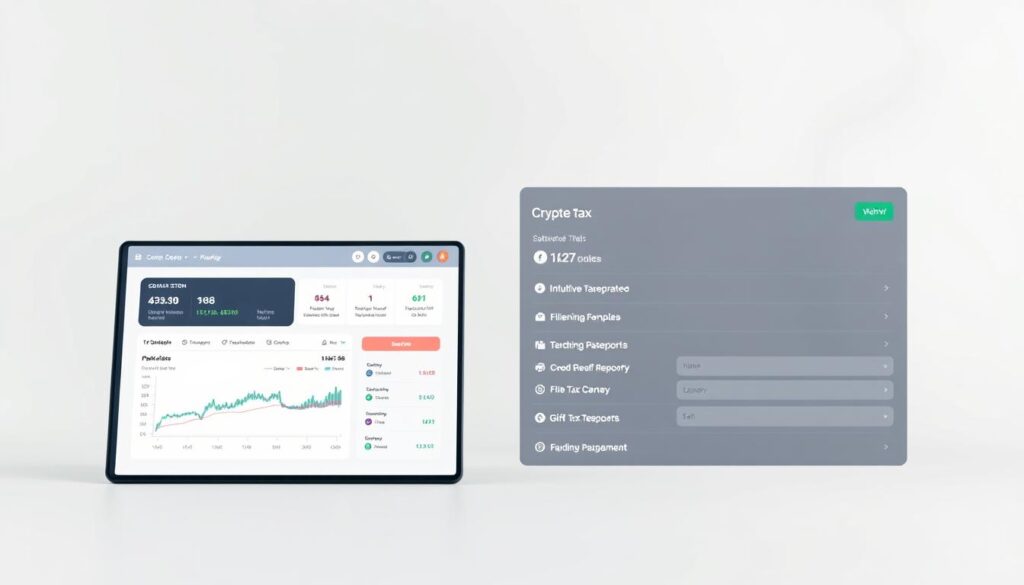Dealing with cryptocurrency taxes can be tricky. You need trustworthy crypto tax software reviews to get it right. This guide shows the top crypto tax software to keep you in line with IRS rules.
Choosing the right tool is key. Look for features like exchange integration, reporting accuracy, and support. This article compares options to help you find the best fit for your crypto and tax needs.
Key Takeaways
- IRS rules demand precise crypto tax reporting to prevent audits.
- Crypto tax software reviews compare security, pricing, and usability.
- Best crypto tax software automates calculations for trades, forks, and DeFi activities.
- Features like Form 8949 and 1040 support ensure accurate filings.
- Readers learn which tools fit small hodlers or large-scale traders.
Understanding the Necessity of Specialized Crypto Tax Software
Crypto investors deal with complex tax rules that regular software can’t handle. They need to track trades, airdrops, and forks. Without the right tools, mistakes in reporting can lead to big problems.
Getting expert crypto tax advice is key. It helps follow IRS rules and avoid legal trouble.
The Unique Challenges of Cryptocurrency Taxation
Crypto transactions bring their own set of challenges:
- Cost basis calculations for frequent trades
- Reporting cross-exchange transfers as taxable events
- Classifying DeFi staking rewards as income
How Tax Software Simplifies Compliance with IRS Regulations
Specialized tools make things easier:
- Tracking every transaction across platforms
- Generating IRS Forms 8949 and Schedule D
- Applying FIFO/LIFO methods for accurate cost basis
The Consequences of Improper Crypto Tax Reporting
Misreporting can cause serious issues:
- Penalties up to 75% of owed taxes
- Audit triggers from unexplained income gaps
- Legal liabilities for willful neglect
Key Features to Look for in Quality Crypto Tax Software
Choosing the right top cryptocurrency tax tools means looking at key features. A good cryptocurrency tax calculator must handle complex transactions like airdrops and forks right. It should also automatically sort trades as short-term or long-term gains, following IRS rules.
- Transaction Categorization: Tools that sort trades, staking, and DeFi activities into taxable events simplify audit preparation.
- Tax-Loss Harvesting: Advanced platforms optimize capital losses to offset gains, maximizing savings.
- Historical Price Data: Accurate crypto price records at the time of each transaction prevent reporting errors.
- Customizable Reports: Exportable forms like Form 8949 and Schedule D save time during tax season.
Software updates are key. Top tools keep up with new IRS rules and assets like NFTs. They also have audit trail features to show changes in calculations. This is important for IRS reviews.
For those with many trades, real-time blockchain sync is crucial. But for those with fewer trades, easy-to-use interfaces are more important. When choosing, look for tools that are both complex and easy to use.
The best cryptocurrency tax calculator fits your portfolio size, whether it’s small or large. Try free trials of top cryptocurrency tax tools to see which features meet your needs.
How Crypto Tax Software Integrates with Major Exchanges and Wallets
Getting started with crypto tax tracking is easier with software that connects well with exchanges and wallets. Secure crypto tax software solutions link up directly to these platforms. This makes it easier to track your taxes without making mistakes.

Direct API Connections vs. CSV Imports
API connections pull in data from places like Binance and Coinbase automatically. Tools like Koinly and CoinTracking use APIs to update your trades right away. On the other hand, CSV imports need you to upload data yourself, which is good for older data or platforms not supported by APIs.
When compare crypto tax solutions, think about how often you trade. This will help you choose the right method for you.
Multi-Exchange Support Capabilities
Top tools work with over 5,000+ exchanges and wallets. ZenLedger handles big exchanges, while CoinLedger covers decentralized ones. They also support different chains like Ethereum and Solana, making sure all your activities are tracked.
Before picking a tool, check if it supports the exchanges you use.
DeFi and NFT Transaction Tracking
DeFi activities like liquidity pools and staking need special tracking. Tools like TokenTax mark yield farming as taxable. NFT sales on OpenSea need accurate cost-basis calculations.
Look for solutions that automatically mark these transactions. This helps avoid problems during audits.
Comprehensive Crypto Tax Software Reviews for 2023
Finding the best crypto tax software means picking one that fits your trading style. Here are in-depth reviews of top platforms. They highlight what each can do and what they can’t.
CoinLedger (formerly CryptoTrader.Tax)
CoinLedger works with over 500 exchanges and blockchains. It provides detailed reports for 200+ countries. But, it might cost more for those with smaller portfolios.
- Strengths: automated wash-sale detection, IRS Form 8949 generation
- Limitations: steeper learning curve for casual investors
TokenTax
TokenTax focuses on following IRS rules. It helps with Form 1040 Schedule D. It also tracks DeFi activities and updates prices in real-time.
- Strengths: 20+ language support, free plan for small portfolios
- Limitations: limited mobile app functionality
ZenLedger
ZenLedger is easy to use. It calculates capital gains automatically and supports NFTs and DeFi. You can try it for free before paying.
- Strengths: automatic Form 8300 reporting, CSV import flexibility
- Limitations: fewer advanced audit tools than competitors
Koinly
Koinly makes tracking different currencies easy. It has a blockchain explorer for accurate trade tracking.
- Strengths: free tier for up to 500 transactions, open-source codebase
- Limitations: limited customer service hours
CoinTracking
CoinTracking has 20+ years of experience in crypto tax. It handles data from 2009, perfect for long-term investors.
- Strengths: manual transaction entry for unlisted platforms
- Limitations: interface less modern compared to newer rivals
Pricing Comparison: Finding Value Without Compromising Quality
When compare crypto tax solutions, prices vary a lot. Platforms like CoinLedger, TokenTax, and ZenLedger have different plans. These plans depend on how much you trade, what you need, and what features you want.
Free trials and basic plans start at $0. But, plans for those who trade a lot can cost over $100 a year.
- Transaction limits: Free tiers often cap at 100-250 transactions, while paid plans support thousands.
- Exchange support: Premium tiers unlock access to niche exchanges or DeFi platforms.
- Hidden costs: Some providers charge extra for state tax filings or audit support.
Koinly’s Pro plan ($79) lets you have unlimited transactions and includes IRS form 8949. CoinTracking’s $59/year plan offers CSV export tools. It’s important to look for clear pricing to avoid surprises at tax time.
When picking top cryptocurrency tax tools, think about the cost now and the savings later. Spending $100 on audit support could save you more than that in IRS penalties. Check the pricing for buying in bulk or for annual vs. monthly payments.
Start with free trials if you have a small portfolio. If you trade a lot, you need a plan that grows with you. Make sure the plan includes all the reports you need, like Form 1040 schedules, to stay compliant.
User Experience Analysis: Interfaces and Learning Curves
Choosing crypto tax software is all about finding the right balance. It’s about how easy it is to use and how well it works. Different platforms offer different ways to help with tax reporting, from simple designs to special tools. Let’s look at how these interfaces meet user needs.

Beginner-Friendly Options
For beginners, ZenLedger and Koinly are great choices. They have step-by-step guides and clear dashboards. ZenLedger makes importing easier with visual guides. Koinly’s tax calculator makes basic reports simple.
These tools help new users understand crypto taxation better.
Advanced Platforms for Experienced Traders
Experienced traders like CoinLedger and TokenTax for their advanced features. CoinLedger lets you make manual adjustments for complex trades. TokenTax works with DeFi protocols.
These platforms offer deep features for those who need expert crypto tax advice.
Mobile App Availability and Functionality
Mobile access varies among platforms. ZenLedger’s app updates transactions in real time. CoinLedger’s app offers basic reporting on iOS and Android.
Koinly’s mobile app tracks your portfolio but doesn’t let you edit reports. Make sure the app you choose supports important features like import checks or alerts.
Support for Different Tax Calculation Methods
When it comes to taxes on cryptocurrencies, flexibility is key. Top secure crypto tax software lets you pick from FIFO, LIFO, HIFO, or specific identification strategies. Each method affects how you report capital gains, so it’s important to choose wisely based on your financial goals.
- FIFO (First In, First Out): This method assumes you sell the oldest assets first. It can help spread out gains over time.
- LIFO (Last In, First Out): It uses the most recent purchases first. This can lower taxable gains in markets that are up and down a lot.
- HIFO (Highest In, First Out): This method focuses on selling the most expensive assets first. It can reduce taxable income.
- Specific Identification: This method lets you choose which coins to track. It’s good for keeping precise records of cost bases.
The IRS requires US taxpayers to stick with one method for all transactions. Software like CoinLedger and Koinly let you see how different methods affect your taxes. They also suggest the best method based on your transactions. But, changing methods without the right documentation can lead to audits.
So, it’s crucial to make sure your software supports all IRS-approved methods. This ensures you’re in compliance and avoids any issues.
Security Protocols: Protecting Your Financial Data
When picking secure crypto tax software, look at encryption, audits, and access controls. Top platforms protect your data with advanced security. They prevent breaches and follow financial rules.
Encryption Standards and Data Protection
Top names like ZenLedger and Koinly use AES-256 encryption for data at rest. They also use TLS for data in transit. This keeps your transaction records safe from unauthorized access.
CoinLedger adds bank-grade encryption for API connections to exchanges. This reduces risk during data transfers.
Third-Party Security Audits
Platforms that get independent audits by firms like Cure53 or NCC Group show they’re serious. TokenTax shares audit reports every year. CoinTracking does quarterly penetration testing.
These audits let users check if a platform’s security claims are true.
User Access Controls and Authentication Options
Multi-factor authentication (MFA) is common, but options vary. ZenLedger offers biometric login, while Koinly lets you block access from certain locations. It’s important to check access settings and data policies when choosing a provider.
When compare crypto tax solutions, focus on those with clear security policies. Look for real-world breach prevention. This way, your financial data stays safe while you report your taxes accurately.
Tax Form Generation and Direct Filing Capabilities
Crypto tax software reviews show how tools like CoinLedger and Koinly make tax filing for cryptocurrencies easier. They automatically create IRS forms like Form 8949, Schedule D, and Schedule C. This ensures you follow the rules for crypto taxes. You also get templates to figure out capital gains, losses, and income from mining or staking.

- Customizable form edits for manual adjustments
- Preview tools to spot errors before submission
- Direct e-filing options for IRS submissions
Software like ZenLedger helps with state-level reporting for crypto gains. TokenTax supports international forms for those outside the US. Reviews show Koinly works with TurboTax, while CoinTracking lets you export to CSV for professionals. Make sure your chosen tool can handle Form 1040 Schedule 1 for high-income filers.
It’s important to check for accuracy—some platforms warn about missing data before creating forms. Always try out free trials to see if the software fits your needs. Direct filing options are available but vary by provider, so check each tool’s IRS integration.
Handling Complex Scenarios: DeFi, Staking, and Mining
Dealing with DeFi, staking, and mining needs careful tax tracking. The best crypto tax tools make it easier with features for these activities. Getting expert advice is key to report these complex deals right.
DeFi Protocol Support
DeFi sites like Uniswap or Aave have liquidity pools and smart contracts. Tools like Koinly and CoinTracking make tracking easier by importing data. They mark taxable events like token swaps, cutting down on manual work.
Make sure your tool supports the DeFi platforms you use. If not, you might need to enter data manually.
Staking Rewards Calculation
Staking rewards differ by platform. ZenLedger and CoinLedger help tell taxable income from non-taxable events. It’s important to know if you’re staking directly or through others.
Check if your tool follows IRS rules. This helps avoid mistakes in reporting.
Mining Income Tracking
Mining software must track rewards and hardware costs. Koinly lets you track rig depreciation, while CoinLedger makes mining income easy to categorize. Getting expert advice ensures you report mining income correctly.
Choosing the right tool from top cryptocurrency tax tools is crucial. Make sure it fits your activities to avoid IRS fines.
Customer Support Quality and Availability
Good customer support is key when dealing with crypto tax issues. The best crypto tax software companies make it easy to get help. They offer live chat, email, and ticket systems, but how fast they respond can vary.
ZenLedger and Koinly have live chat 24/7 during busy tax times. But, TokenTax only helps during business hours. You can check this guide to see how different services compare.
- Email support: CoinLedger promises a quick 24-hour reply. CoinTracker’s premium users get faster help.
- Self-help resources: TokenTax and ZenLedger have lots of guides and videos. This means you might not need to ask for help as much.
- Expert access: ZenLedger even offers expert crypto tax advice through CPA consultations for tricky cases.
When tax season hits, support teams work harder. TokenTax users say they get help faster in March and April. But, some services might not be available outside US time zones.
Paying for premium services, like Koinly’s, can get you a dedicated account manager. This is great for traders who deal with a lot of transactions.
Choosing software with good support means you get help fast when you need it. Make sure to check if you get expert crypto tax advice. This can help avoid mistakes that might lead to audits.
Integration with Traditional Tax Software
Managing crypto taxes needs tools that work with TurboTax or H&R Block. Top cryptocurrency tax calculators now make filing taxes easier. They offer features to work with these services. Many platforms create IRS-ready forms that users can import or enter manually.
Each provider is different, so it’s important to check them out. Below are key integration points for major services:
TurboTax Compatibility
Most crypto tax tools let TurboTax users export IRS Form 8949 and Schedule D data. Koinly and ZenLedger offer TurboTax-specific templates for easy import. If direct links aren’t available, users can still enter data manually.
H&R Block Integration
H&R Block users can import crypto data by exporting reports from their tax calculator. While there’s no direct API connection, detailed export options ensure accurate data transfer. Check the software’s documentation for H&R Block export settings.
Working with Professional Tax Preparers
Professional preparers often prefer crypto tax software with secure client portals. ZenLedger and CoinTracking allow CPA access to tax reports while keeping user privacy. Many platforms also create IRS-compliant summaries for easy review during consultations.
Error Handling and Audit Support Features
Handling crypto taxes can be tricky. Even small mistakes can cause big problems with the IRS. Secure crypto tax software has tools to find errors like missing transactions or wrong prices. It uses algorithms to spot these issues, letting users fix them before filing.
Reconciliation tools help find duplicates or missing data. This makes sure reports are correct.
- Error detection systems that highlight inconsistent transaction records
- Automated reconciliation checks for balancing inflows and outflows
- Audit trail logs documenting every data source and calculation step
Platforms like CoinLedger and ZenLedger offer audit trail reports for IRS agents. Some even have audit help packages, including document prep and expert advice. When comparing crypto tax solutions, look for tools that verify disputed transactions.
It’s important to pick software that keeps a full record of transactions. Clear audit trails help avoid penalties by showing you followed IRS rules. If errors happen, advanced platforms like Koinly show where data doesn’t match.
Choosing the right crypto tax software makes audits easier. Taxpayers should compare options to find the best audit support for their needs. Good systems automatically find unusual data and keep detailed records for audits.
Implementation Guide: Getting Started with Your Chosen Software
Setting up your cryptocurrency tax calculator right is key to tracking accurately from the start. Here are steps to get the most out of the top cryptocurrency tax tools:
- First, create an account with two-factor authentication. Link your exchanges and wallets early to keep your transaction history complete.
- Next, organize your accounts into folders for different crypto platforms. Use the software’s search tools to check all linked addresses match your records.
Historical Data Import Strategies
When importing past transactions, start with the exchanges you trade most. Most top cryptocurrency tax tools support CSV uploads. Make sure to check the export settings for date ranges to avoid duplicates. If you find mismatched data, use blockchain explorers like Etherscan to verify.
Ongoing Maintenance Tips
- Do weekly checks using the platform’s audit tools
- Mark any odd transactions for manual review right away
- Save yearly reports to a secure cloud drive as backups
Keeping your software up to date is crucial. It ensures your tax calculations stay in line with IRS rules. If you have DeFi or staking activities, turn on automatic protocol tracking. Regular updates make tax prep easy by April 15.
Making Your Informed Decision: Aligning Software Choice with Your Crypto Portfolio
Choosing the best crypto tax software is all about matching your needs. Look for features like support for multiple exchanges, DeFi tracking, and budget options. Casual investors might like ZenLedger or Koinly for their ease of use and IRS reporting.
For those who trade often, CoinLedger is a better choice. It handles complex trades, forks, and rewards. DeFi users should check if the software supports platforms like Uniswap or Aave.
Institutional investors need advanced tools. TokenTax offers audit trails and API integrations. CoinTracking has tiered plans for different activity levels. Try free trials to see if the interface fits your comfort level.
AI-based solutions, like those from Cryptomaximal, can make complex calculations easier. This ensures accurate filings.
Keep an eye on software updates for IRS compliance. Choose platforms that allow exports for TurboTax or H&R Block. Start early to avoid last-minute mistakes.
Compare features like error detection and audit support. The right software helps you find deductible losses and optimize reporting. It turns tax prep into a strategic process.
FAQ
What is crypto tax software?
Crypto tax software helps investors and traders with their taxes. It’s made for the unique needs of cryptocurrency, like trading and staking rewards. It makes sure you follow IRS rules and report your taxes correctly.
Why do I need specialized crypto tax software instead of regular tax software?
Regular tax software can’t handle cryptocurrency well. It needs special tools for tracking and calculating crypto transactions. This includes managing gains and losses from trading and DeFi activities.
What features should I look for in the best crypto tax software?
Look for tools that categorize transactions and help with tax-loss harvesting. Make sure it supports major exchanges and is easy to use. It should also generate detailed tax forms and update data in real-time.
Is my data safe with crypto tax software?
Data security is key. Choose software with strong encryption and regular security checks. It should also have good user controls to protect your financial information.
Can I integrate crypto tax software with my existing tax preparation tools?
Many crypto tax solutions work with popular tax software like TurboTax. This makes filing your taxes easier by importing data or creating compatible forms.
What happens if I don’t report my cryptocurrency earnings correctly?
Not reporting earnings right can lead to big problems. You might face penalties, audits, and legal issues with the IRS. Using crypto tax software can help avoid these issues.
How does crypto tax software handle complex transactions like DeFi or staking?
Good crypto tax software can handle complex transactions. It tracks various activities, ensuring accurate reporting. This gives you a clear view of your tax obligations.
Are there free options for crypto tax software?
Yes, some tools offer free versions or trials. But, be aware of any limitations on features or transactions.
How do I know which crypto tax software is right for me?
The best software depends on your trading volume and portfolio size. Consider your needs, like DeFi support. Reading reviews and comparing features can help you choose.


No comments yet